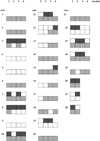Investigation of a Rotavirus Gastroenteritis Outbreak among Immunosuppressed Patients in a Hospital Setting
- PMID: 35923213
- PMCID: PMC9344559
- DOI: 10.4172/2329-9541.1000153
Investigation of a Rotavirus Gastroenteritis Outbreak among Immunosuppressed Patients in a Hospital Setting
Abstract
Objective: Rotavirus (RV) is the most common cause of severe dehydrating diarrhoea in healthy infants and young children. The aims of this study were to investigate a RV outbreak in the pediatric hematology and oncology ward and to examine possible associations between immune status and RV infection.
Patients and methods: Twenty-eight children (19 boys and 9 girls) who were hospitalized for treatment of hematological malignancy and solid organ tumor during the RV outbreak were enrolled in this study. Fourteen of the 28 patients developed RV gastroenteritis (GE) during the observation period. RV antigen and RV IgG and IgA were measured by enzyme-linked immunosorbent assays. RV G and P types were determined by reverse transcriptase-polymerase chain reaction.
Results: Mean duration of RVGE in 14 patients was 13.9 days and mean severity score was 7.4. Two RV strains (G3P [8] and G2P [4]) were mainly circulating in the ward, which might result in the formation of a reassortant G2P [8] strain and mixed infection with G2+3P [8] in the immunocompromised patients. RV antigenemia was detected in 22 of the 28 patients (78.6%). RV-specific IgG titers in acute-phase sera of RVGE group were significantly lower than those in non-RVGE group (P=0.001). Mean age of the patients was significantly lower in RVGE group (5.5 ± 4.6 years) than non RVGE group (10.6 ± 4.5 years) (P=0.015).
Conclusion: Our data demonstrate that host factors including age, underlying diseases, and immune status may be associated with the susceptibility of RV infection in immunocompromised patients at the time of the nosocomial infection.
Keywords: Antigenemia; Gastroenteritis; Immunocompromised patients; Rotavirus.
Conflict of interest statement
Potential conflicts of interest. All authors report no conflicts of interest relevant to this article.
Figures


Similar articles
-
Gastroenteritis attributable to rotavirus in hospitalized Saudi Arabian children in the period 2007-2008.Clin Epidemiol. 2015 Feb 11;7:129-37. doi: 10.2147/CLEP.S69502. eCollection 2015. Clin Epidemiol. 2015. PMID: 25709500 Free PMC article.
-
Surveillance to estimate the burden of rotavirus gastroenteritis in children aged less than 3 years attending day care centers in Paris, France.Hum Vaccin. 2010 May;6(5):399-406. doi: 10.4161/hv.6.5.11021. Epub 2010 May 22. Hum Vaccin. 2010. PMID: 20431346
-
Primary care-based surveillance to estimate the proportion of rotavirus gastroenteritis among Latvian children below 5 years of age with acute gastroenteritis.Hum Vaccin Immunother. 2019;15(6):1272-1278. doi: 10.1080/21645515.2018.1534515. Epub 2018 Oct 31. Hum Vaccin Immunother. 2019. PMID: 30335570 Free PMC article.
-
Burden of community-acquired and nosocomial rotavirus gastroenteritis in the pediatric population of Western Europe: a scoping review.BMC Infect Dis. 2012 Mar 19;12:62. doi: 10.1186/1471-2334-12-62. BMC Infect Dis. 2012. PMID: 22429601 Free PMC article.
-
Infection status and circulating strains of rotaviruses in Chinese children younger than 5-years old from 2011 to 2018: systematic review and meta-analysis.Hum Vaccin Immunother. 2021 Jun 3;17(6):1811-1817. doi: 10.1080/21645515.2020.1849519. Epub 2021 Mar 2. Hum Vaccin Immunother. 2021. PMID: 33651653 Free PMC article.
References
-
- St Geme JW 3rd, Hyman D (1988) Hepatic injury during rotavirus infections. J Pediatr 113: 952–3. - PubMed
-
- Teitelbaum JE, Daghistani R (2007) Rotavirus Causes Hepatic Transaminase Elevation. Dig Dis Sci 52: 3396–3398. - PubMed
-
- Contino MF, Lebby T, Arcinue EL (1994) Rotaviral gastrointestinal infection causing afebrile seizures in infancy and childhood. Am J Emerg Med 12: 94–95. - PubMed
-
- Kawano G, Oshige K, Syutou S, Koteda Y, Yokoyama T, et al. (2007). Benign infantile convulsions associated with mild gastroenteritis: A retrospective study of 39 cases including virological tests and efficacy of anticonvulsants. Brain Dev 29: 617–622. - PubMed
Grants and funding
LinkOut - more resources
Full Text Sources
Miscellaneous
